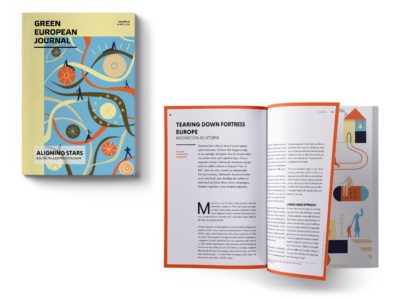Could EU enlargement, combined with an acknowledgement of its imperialist heritage and the introduction of Europe-wide common citizenship, put an end to warring nation-states?
Enlargement of the European Union resurfaced on the geopolitical horizon in 2022. The accession of aspiring countries was back on the agenda out of dire necessity when Russia escalated its war on Ukraine. Military assaults on the Ukrainian state also threatened a united Europe, and war wounds both instil a sense of urgency and evoke phantasms intended to soothe unbearable pain.
Since then, various other international conflicts have impacted the EU to its east and south. From Azerbaijan’s military seizure of Armenian-controlled Nagorno-Karabakh to renewed tension between Serbia and Kosovo, coup upheavals in the Sahel, and an all-out Israeli-Palestinian war, disparate armed clashes have coalesced over the past year, creating a warfare belt around the EU. A polywar has absorbed pre-existing tensions and spawned new ones.
While some Western voices profess that Ukraine is not grateful enough for the support it has received to protect itself and repel its invaders, the reality is quite the opposite. Ukrainian resistance has so far contained Russian aggression within its borders, allowing EU countries to continue living in peace. On a political level, Ukraine’s self-defence has been hugely advantageous to European unity.
The EU project is up against a surge of the extreme right in the run-up to crucial elections both inside the bloc and across the world. With a fascist resurgence looming, threatening the survival of a united Europe, the politics of enlargement should be considered as a means to sustain the project. When perceived not just as a technocratic procedure with a set of institutional requirements (which will inevitably be needed too) but also as Europe’s re-foundational process, enlargement will ensure that the EU embraces what its current incarnation is badly lacking.
The EU’s major and most challenging problem underpins its very creation: war.
The EU’s major and most challenging problem underpins its very creation: war. Conceived as a unifying post-war project, to borrow Tony Judt’s famous description, the EU took “never again” as its guiding principle. However, unlike the universal appeal of Käthe Kollwitz’s artwork on the human condition in war, in practice the EU supposes that “it should never happen again to us”. Such beginnings have defined a reactive modus operandi within EU politics that is incapable of acting ahead, is constantly belated, and barely catches up with actual developments.
The EU is facing a military puzzle. It has no experience of existing without NATO – in other words, the US – and its nuclear umbrella, and yet its most urgent task is to make a functioning enlarged Union possible, transforming a post-war project into a “pre-war” one. To date, it has not managed to develop a proactive, efficient mechanism capable of preventing wars not only inside but also beyond its borders, wherever a renewed EU could reach out and apply political pressure. Outside, neighbouring armed combat is a guarantee of political cracks from within, and if Russia’s war conduct is not disrupted by international efforts, today’s liberal political forces across Europe will soon find themselves deeply opposed, contemplating how great the idea of a united Europe had been.
The second issue decisive for Europe’s future is dealing with an imperial past and its persistent legacies. The EU must stop pretending it is a coalition of nation-states that got together in mutual understanding for peaceful cooperation. Instead, it needs to acknowledge that, by its very nature, a united Europe is a post-imperial project, which became possible only after the demise of European empires. So far, the EU has cautiously addressed colonialism only on soft territory, through culture and the arts. While the rest of the world, particularly the so-called Global South, is foremost and unavoidably looking at Europe through a postcolonial lens, the issue has not seriously entered internal realpolitik.
Recognising the EU as an entity with imperialist heritage is also highly instructive for the Russian case – only the empire’s military defeat and subsequent collapse can bring about progressive post-imperial change. Besides, the Union combines both former empires and colonised countries, some of which have entwined histories. This fundamental dimension of the EU’s heritage will become even more significant should it expand east and south, as its historical depth will grow. Thoroughly tackling uneradicated colonialism is a reliable remedy for honourable interrelations and effective interdependence in the future.
A third prerequisite for accomplishing the European project concerns citizenship. For a renewed, expanded EU model to deal with new global challenges, its juridical rationale has to be revised and reaffirmed on an all-European basis. Establishing a common European citizenship would, in effect, create the first international democracy in history, overcoming the limits of the nation-state.
The absence of prospects for a common citizenship predestined the historic failure of the European Constitution almost twenty years ago. If a polity aims at constituting democratic power over certain territories, people throughout must be legally referred to as equal citizens – civilitas, or government politics, should go hand in hand with civitas, or citizens united by law. Establishing a common European citizenship for peoples of diverse origin from different European countries would not only be a revolutionising moment of EU enlargement changing the entire continent but also a determinative step towards putting a real end to the war logic gradually absorbing Eastern Europe.
With the notion of “never” being irretrievably lost, this might be the only way for Europe to stop today’s endless refrain of war, sounding just like bombardments – again, and again, and again.

